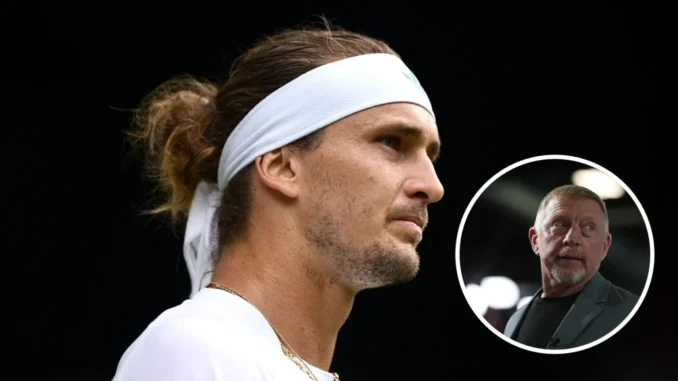
In the wake of Alexander Zverev’s shocking first-round exit at Wimbledon 2025, tennis legend Boris Becker has voiced concern over his compatriot’s emotional vulnerability and coaching setup, offering insights that highlight both empathy and critique. Zverev, the world No. 3, suffered a grueling five-set defeat to Arthur Rinderknech, marking his worst Grand Slam performance in six years. The loss, a 7-6(3), 6-7(8), 6-3, 6-7(5), 6-4 marathon that spanned two days, prompted an uncharacteristically candid press conference where Zverev laid bare his mental struggles. “I’ve never felt this empty before,” he confessed. “Just lacking joy in everything that I do. It’s not necessarily about tennis. Just lacking joy outside of tennis as well.” These raw admissions struck a chord with Becker, who, while supportive, suggested he would have advised against such public disclosures if he were Zverev’s coach.
Becker, a six-time Grand Slam champion and a towering figure in German tennis, expressed a deep personal connection to Zverev, describing him as a “sporting adopted son.” Speaking on his Becker Petkovic podcast, he revealed the emotional impact of Zverev’s words: “I watched the press conference live and I cried. A person opened up and said, ‘I have problems, I have mental problems, help me. I don’t have anyone around me except my daughter, who is four years old, with whom I like to spend time, where I laugh and smile.’” However, Becker cautioned that such openness after a first-round Grand Slam exit might not serve Zverev’s competitive image. “If I had been his coach, I would have advised him not to reveal such information about his mental state at the Wimbledon press conference,” he said. “Ideally, you don’t open up when you’re eliminated in the first round of a Grand Slam tournament.”
Zverev’s 2025 season has been a rollercoaster. A stellar start saw him reach the Australian Open final, only to fall to Jannik Sinner. He followed with a title at the BMW Open in April and a runner-up finish at the Stuttgart Open, but his form faltered with a French Open quarter-final loss to Novak Djokovic and the Wimbledon upset. These setbacks reignited scrutiny of his coaching team, led by his father, Alexander Zverev Sr., and occasionally supported by his brother, Mischa. Becker has previously urged Zverev to consider a coaching overhaul, drawing parallels to Rafael Nadal’s pivotal decision to part ways with his uncle Toni to invigorate his career. “He is the chairman of the board, the CEO. He decides what Team Zverev will look like in the future,” Becker noted after the French Open. “His father and brother did an excellent job, but it wasn’t good enough for the final step.”
Zverev’s response to such critiques has been defiant. After his French Open loss, he clapped back at Becker and pundit Barbara Rittner, saying, “When things are going well for me, I always do everything right. When things are going badly for me, everyone else is very, very clever. Unfortunately, Boris is one of them.” Despite the tension, Zverev acknowledged Becker’s stature, stating, “I still have enormous respect for him. He is an absolute legend, not only in sport, but in Germany in general, and also worldwide.” This complex dynamic underscores a relationship marked by mutual admiration but strained by public disagreements.
Recent developments suggest Zverev is exploring new coaching avenues. Following Wimbledon, he trained briefly at the Rafa Nadal Academy in Mallorca, working with Toni Nadal, sparking speculation about a potential partnership. However, Toni confirmed the collaboration was temporary, citing his commitments to the academy and the Mallorca ATP event. Becker, intrigued by the prospect, questioned how Toni would integrate with Zverev’s family-led team, noting, “My question is, what does his father do? What does his brother do? Do they still play an active role in his tennis life?” He praised Toni’s disciplined approach, emphasizing his insistence on punctuality and respect for the sport, qualities that could challenge Zverev, who has faced criticism for occasional lapses in discipline.
As Zverev prepares for the Canadian Open, where he is the top seed due to withdrawals from Sinner, Djokovic, and Carlos Alcaraz, Becker remains optimistic about his potential. “I am convinced that he will win a Grand Slam and that he can become number one at some point,” he said, while stressing the difficulty of sustaining top-tier success. Zverev’s openness about considering therapy—“Maybe for the first time in my life I’ll probably need it”—signals a willingness to address his mental barriers, a step Becker views as both courageous and risky in the public eye. With the US Open on the horizon, Zverev’s ability to regroup, possibly with fresh coaching perspectives, could determine whether he finally breaks through or continues to grapple with the weight of unfulfilled potential.
Leave a Reply